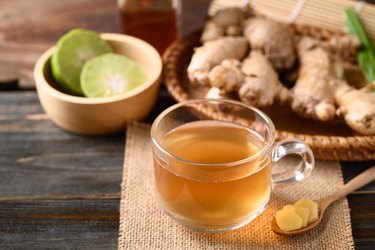
Ginger has been used as a culinary spice and medicinal remedy for thousands of years. However, fresh ginger, supplements and products containing the popular herb, such as ginger tea, may not be safe for everyone.
Ginger and Medications
Video of the Day
There's no definitive science on the effects of ginger on blood pressure medications. And, for the most part, the research is not there to conclusively determine whether ginger interacts with medications in general.
Video of the Day
So far, however, there are concerns that the herb may interact with blood thinners, according to the National Center for Complementary and Integrative Health.
As a result, it may not be recommended for people taking the blood thinner warfarin, says Guy L. Mintz, MD, FACC, director of cardiovascular health and lipidology at Sandra Atlas Bass Heart Hospital in Manhasset, New York.
Other meds that may have dangerous interactions with ginger, according to Dr. Mintz, include:
- ticagrelor (Brilinta)
- prasugrel (Effient)
- enoxaparin (Lovenox)
- non-steroidal anti-inflammatory medications like ibuprofen and naproxen
But if you don't take these meds, could ginger help lower your blood pressure?
A systematic review and meta-analysis of six randomized clinical trials, published in April 2019 in Phytotherapy Research, found ginger supplementation had a favorable effect on blood pressure overall, and particularly in people 50 or younger. But, as the authors noted, more research is needed.
The Upside of Ginger
Though more studies need to be conducted, ginger may have certain health benefits, according to Dr. Mintz.
For example, ginger is thought to be anti-inflammatory and to have anti-oxidant benefits. "Ginger components include flavonoids and polyphenolic compounds with high anti-oxidant characteristics," he says. "The flavonoids and phenols have been found in green tea, and studies have shown benefit from green tea use. Anti-inflammatory benefits may also come from the reduction of prostaglandins, leukotrienes and nitric oxide."
All of these substances are involved in your body's inflammatory response — including nitric oxide, which is most often thought of as a blood vessel relaxer, but its overproduction can lead to inflammation, according to a June 2012 study in Cardiology.
Ginger also might have a positive effect on cholesterol levels. "Some studies have shown a decrease in atherosclerotic plaques, reduction of triglycerides and LDL cholesterol in mice," Dr. Mintz says. (LDL is the bad form of cholesterol.) The good cholesterol, HDL, also may increase with ginger, he says, adding that 3 grams a day of ginger may significantly lower lipid levels.
Another potential benefit of ginger in people who are not already taking blood thinners is it has a blood-thinner-like effect. According to Dr. Mintz, researchers are looking into whether a concentrated ginger formulation may be a good alternative to aspirin.
Dr. Mintz also says ginger might have anti-diabetes benefits, such as improving blood sugar levels and increasing insulin levels.
The Bottom Line
Dr. Mintz cautions that all of these are potential benefits and need further study.
"At this point in time, I cannot recommend the routine usage of ginger when better studied, efficacious and safe medications are available to treat hypertension and coronary heart disease," he says. "The suggested mechanisms may play a role in disease, but we are not there yet."
Until then, enjoy ginger, fresh or dried, occasionally in small amounts to season foods as you would with any other spice. If you're taking a blood thinner or if you regularly use medicines like ibuprofen or naproxen, it might be best to skip the ginger in favor of other herbs and spices that are less likely to interfere with your medication.
- Guy L. Mintz, MD, FACC, director, Cardiovascular Health & Lipidology, Northwell Health’s Sandra Atlas Bass Heart Hospital, Manhasset, New York
- National Center for Complementary and Integrative Health: “Ginger”
- Cardiology: “Characterization of the Role of Nitric Oxide and Its Clinical Applications”
- Phytotherapy Research: “Does Ginger Supplementation Lower Blood Pressure? A Systematic Review and Meta-analysis of Clinical Trials”
Is this an emergency? If you are experiencing serious medical symptoms, please see the National Library of Medicine’s list of signs you need emergency medical attention or call 911.